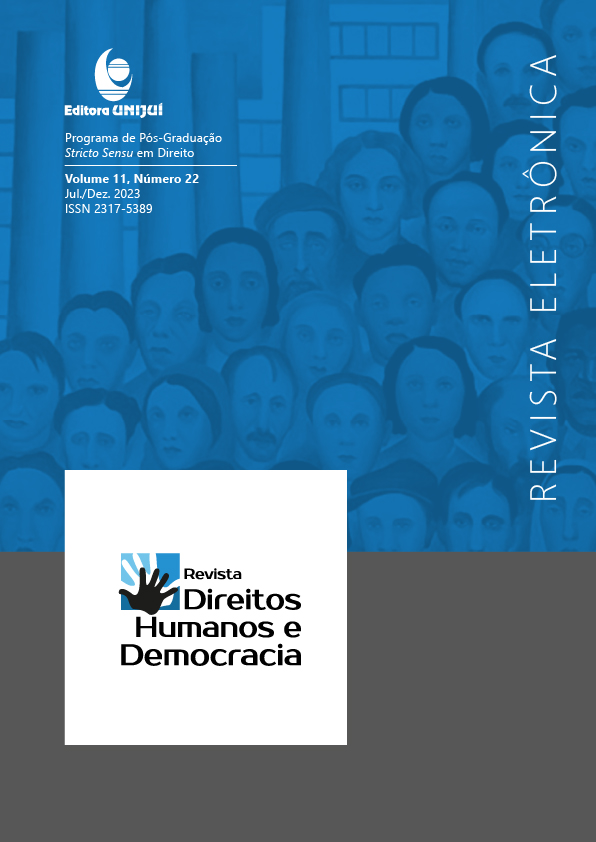Elements of the historical construction of human rights in the first half of the 20th century: The contributions of André Mandelstam and H. G. Wells
DOI:
https://doi.org/10.21527/2317-5389.2023.22.14344Abstract
This study proposes to analyze the contributions of two authors, the Russian-French jurist André Mandelstam and the English writer H. G. Wells, to the construction of human rights in the first half of the 20th century. Mandelstam was the author of one of the first texts on human rights at the international level: the Declaration of International Human Rights of 1929, within the framework of the Institut de Droit International in Paris. Wells, on the other hand, actively participated in the formation of the League of Nations as an English delegate, and in 1940 he published The rights of man, a manifesto with eleven points on fundamental rights that formed the basis for the UN declaration of 1948. The proposal is based on a bibliographical and documentary study based on the declarations and manifestos of two authors and suggests analyzing how, in its own way, it helped to promote human rights in a context in which the concept still did not have a legal and universalist meaning, and was strongly shaken by the threat of great world wars. Although these contributions to the formulation of human rights policies in the second half of the 20th century are not objectively recognized, we consider that both authors played a fundamental role in defining the concept of human rights debated in the political arrangements that allowed for the formation of the UN.
References
ADAK, Hülda. The legacy of André Nikolaievitch Mandelstam (1869-1949) and the early history of human rights. Zeitschrift für Religions – und Geistesgeschichte, v. 70, n. 2, p. 117-130, 2018.
ARENDT, Hannah. As origens do totalitarismo. São Paulo: Cia das Letras, 1989.
AUST, Helmut Philipp. From diplomat to academic activist: André Mandelstam and the history of Human Rights. In: The European Journal of International Law, 25/4, p. 1.105-1.121, 2014.
BENHABIB, Seyla. International law and human plurality in the shadow of totalitarianism: Hanhah Arendt and Raphael Lemkin. Costellations, v. 16, n. 2, 2009, p. 331-350, 2009.
BURGERS, Jan Herman. The road to San Francisco: the revival of the human rights idea in the Twentieth Century. Human Rights Quarterly, v. 14, n. 4, p. 447-477, nov. 1992.
CROWELL, Laura, The building of the “Four Freedoms Speech”. Speech Monographs, v. 22, nov. 1955.
DILLOWAY, James. Human Rights and World Order: Two Discourses to the H. G. Wells Society with some additional material. Nottingham: H. G. Wells Society, 1998.
FASSBENDER, Bardo; PETERS, Anne. The Oxford handbook of the history of international law. Oxford: Oxford University Press, 2012.
HAMANO, Teru. H. G. Wells and the Universal Declaration of the Human Rights. The Wellsian, n. 24, 2001.
IACHTECHEN, Fabio L. “H. G. Wells e o controle social das informações em World Brain (1938).” In: AFFORNALLI, Maria Cecilia Naressi Munhoz; GABARDO, Emerson (org.). Direito, informação e cultura: o desenvolvimento social a partir de uma linguagem democrática. Belo Horizonte: Fórum, 2012, p. 173-183.
KLUG, Francesca. Values for a Godless age: the story of the UK’s New Bill of Rights. Harmondsworth: Penguin, 2000.
MANDELSTAN, A. N. La declaration des droits internationaux de I’homme adoptde par I'lnstitut de Droit international. Revue de Droit International, n. 1, 1930a.
MANDELSTAN, A. N. La declaration des droits internationaux de I’homme. L'Esprit International, Apr. 1930b.
PIOVESAN, Flávia. Direitos Humanos e o Direito Constitucional Internacional. São Paulo: Saraiva, 2012.
RITCHIE-CALDER, Lord. On Human Rights. London: H. G. Wells Society, 1967.
ROBERTSON, Geoffrey. Crimes against humanity: the struggle for global justice. London: Lane; Penguin, 1999.
SMITH, Ali. What we are fighting for? The 2nd anual PEN H. G. Wells Lecture, 15 Aug. 2015. In: WELLS, H. G. Rights of man. London: Penguin, 2015a. p. 7-46.
SMITH, Ali. Celebrating H. G. Wells’s role in the creation of the UN Declaration of Human Rights. The Guardian, 20 nov. 2015b. Disponível em: https://www.theguardian.com/books/2015/nov/20/ali-smith-celebrates-hg-wells-role-creation-un-declaration-of-human-rights.
SMITH, David C. H. G. Wells: desperately mortal. Yale: Yale University Press, 1986.
WELLS, H. G. The rights of man, or what are we fighting for? London: Penguin Books, 2015.
Downloads
Published
How to Cite
Issue
Section
License
Copyright (c) 2023 Revista Direitos Humanos e Democracia

This work is licensed under a Creative Commons Attribution 4.0 International License.
By publishing in the Revista Direitos Humanos e Democracia, authors agree to the following terms:
Articles are licensed under the Creative Commons Atribuição 4.0 Internacional (CC BY 4.0), which allows:
Share — copy and redistribute the material in any medium or format;
Adapt — remix, transform, and build upon the material for any purpose, including commercial use.
These permissions are irrevocable, provided the following terms are respected:
Attribution — authors must be properly credited, with a link to the license and indication of any modifications made;
No additional restrictions — no legal or technological measures may be applied that restrict the use permitted by the license.
Notices:
The license does not apply to elements in the public domain or covered by legal exceptions.
The license does not grant all rights required for specific uses (e.g., image rights, privacy, or moral rights).
The journal is not responsible for opinions expressed in the articles, which remain the sole responsibility of the authors. The Editor, with the support of the Editorial Committee, reserves the right to suggest or request modifications when necessary.
Only original scientific articles presenting research results of interest, not previously published or simultaneously submitted to another journal with the same purpose, will be accepted.
References to trademarks or specific products are intended solely for identification purposes and do not imply any promotional endorsement by the authors or the journal.
License Agreement: Authors retain copyright over their articles and grant the Revista Direitos Humanos e Democracia the right of first publication.













